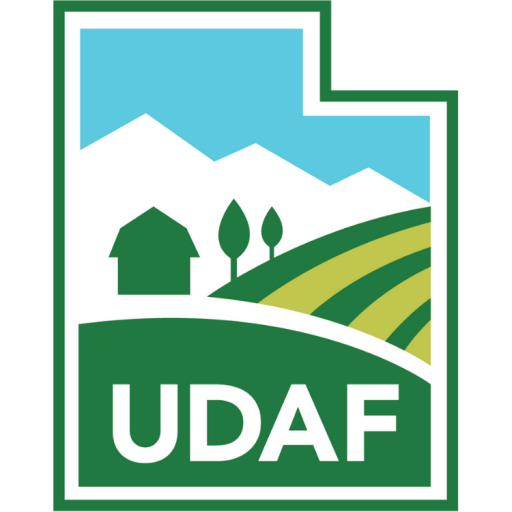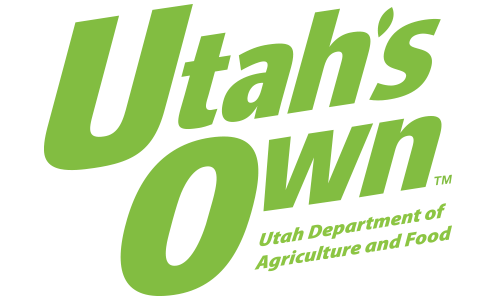The Utah Department of Agriculture and Food administers several grants to help further the development of the state’s agricultural and food industries. Information on open grants and previous grant programs can be found below.
OPEN GRANTS:
Utah Pollinator Habitat Program
-
- The 2024 application period runs March 1 – April 15, 2024.
- The purpose of this program is to achieve the following:
- Increase the amount of available pollinator habitat throughout Utah
- Enhance and expand existing landscapes to improve resources (pollen and nectar) available for pollinators
- Provide better connectivity between habitats to better support beneficial species
- Increase access and availability of native seed resources across the state
- Increase public awareness and involvement to improve pollinator habitat state-wide
Utah Grazing Improvement Program Grant
-
- Application Window: Open Annually Through January 1.
- Program Manager: Troy Forrest – tforrest@utah.gov, (435) 279-3603; Grant Contact: Regional GIP Coordinators
- The Utah Grazing Improvement Program (GIP) provides cost-share grants to rangers for rangeland improvements. Eligible projects include any restoration work that will improve rangeland health, productivity and management. In order for proposals to be competitive, a recommended request maximum is $100,000. Applicants are advised to work with their regional GIP coordinator for application assistance and more information.
- Project examples: elimination of invasive species, reseeding, livestock water development and improvements, fencing, grazing management planning, and any other projects that improve watershed and rangeland health and productivity.
OPENING SOON:
Utah Food Security Processing Grant
-
- Contact: Allison Ross – aross@utah.gov, (385)549-7987
- This reimbursement grant is open to meat, poultry, and fruit and vegetable processors located in Utah with fewer than 100 employees who plan to make an immediate impact on the state’s capacity to process or store Utah raised protein or Utah grown products.
- $1,000,000 total is available; award amounts will be dependent on the total amount of eligible applications received and approved.
CLOSED GRANTS:
Agricultural Voluntary Incentives Program (AgVIP)
Agricultural Voluntary Incentives Program (AgVIP)
- 2023 Application Window: Closed
- Contact: Katie Slebodnik, kslebodnik@utah.gov, (385) 224-9447
- The Agricultural Voluntary Incentive Program (AgVIP) provides financial incentives to producers who participate in developing a comprehensive nutrient management plan (CNMP) to help maximize crop yields while staying in compliance with state water quality regulations. Eligible producers may receive a one-time $1,000 payment to work with a conservation planner to develop a CNMP and after one year of implementation, may be paid $12 per acre for areas covered in the CNMP.
Agricultural Water Optimization Grant
Agricultural Water Optimization Grant
- Application Window: Closed
- Contact: udaf-wateroptimization@utah.gov
- The Agricultural Water Optimization Program provides grants of up to $500,000 for projects that reduce consumptive water use while maintaining or improving agricultural production and profitability while increasing operational flexibility for agricultural water users.
Invasive Species Mitigation Grant
Invasive Species Mitigation Grant
-
- Application Window: Closed
- Contact: Aaron Eager – aeagar@utah.gov, (801)602-1961
- The Invasive Species Mitigation Grant is a competitive grant that allocates funds to projects with noxious weed management strategies that have a high degree of potential success in Utah.
- Eligible organizations include universities, cooperative weed management areas (CWMA’s), county weed boards, federal and state agencies, federal, state, tribal, and private landowners, conservation districts, nonprofits, and/or other political subdivisions.
- Eligible activities include early detection and rapid response, treating critical acres that protect larger land use areas, monitoring and preventing the spread of small populations and new introductions, monitoring and rehabilitating established infestations, research related to invasive species.
LeRay McAllister Working Farm and Ranch Fund
- 2023 Application Window: Closed
- Contacts: Jeremy Christensen, jeremyc@utah.gov, 385.441.4106 or Roberta Valdez, robertavaldez@utah.gov, 801.982.2226
- Formerly known as the LeRay McAllister Critical Land Conservation Fund, the Fund works to preserve or restore critical agricultural land in Utah by purchasing development rights on these critical lands.
- This fund grant allows farmers and ranchers to continue to utilize their land for agriculture and secures Utah’s local food security. This program also helps maintain open space, which benefits wildlife and keeps Utah’s landscape open and beautiful.
Resilient Food Systems Infrastructure (RFSI) Program
Resilient Food Systems Infrastructure (RFSI) Program
-
- Application Window: Closed
- Contact: Allison Ross – aross@utah.gov, (385)549-7987
- The purpose of the Resilient Food Systems Infrastructure (RFSI) program is to build resilience in the middle of the food supply chain, to provide more and better markets to small farms and food businesses, to support the development of value-added products for consumers, fair prices, fair wages, and new and safe job opportunities.
- Meat and poultry, wild-caught seafood, exclusively animal feed and forage products, fiber, landscaping products, tobacco, or dietary supplements are all ineligible products for this grant.
- Two grant types are available:
- Infrastructure Projects of $100,000-$750,000 (25-50% cost match required), or
- Simplified Equipment-only Projects of $10,000-$100,000 (no cost match required)
Soil Health Equipment Grant
-
- 2023 Application Now Closed
- Contact: Tony Richards, tdrichards@utah.gov, (435)452-2296
- Eligible entities include organizations that work directly with farmers and ranchers such as local Conservation Districts.
- The Soil Health Equipment Grant will assist farmers and ranchers in the conservation district areas with purchasing equipment linked to implementing soil health principles.
- All grants will require a minimum of 20% match and equipment requested must be tied to implementing soil health
Speciality Crop Block Grant Program
Specialty Crop Block Grant Program
-
- Application Window: Closed
- Contact: Allison Ross, aross@utah.gov
- The Specialty Crop Block Grant Program (SCBGP) is a competitive program that awards grants of up to $70,000 to eligible projects that enhance Utah’s specialty crop industry. Specialty crops include fruit, vegetables, nuts, horticulture products, etc.
- Eligible applicants include producers, schools, trade associations, non-profits, farmers markets, farming and ranching co-ops, etc. headquartered in Utah.
- Eligible projects must benefit more than one producer or organization and may include a broad range of focus such as improving marketing, research, training, certifications, plant health, etc. for specialty crops.
UGIP Predatory Animal Control Grant
UGIP Predatory Animal Control Grant
-
- 2022 Application Window: Now Closed
- Program Manager: Troy Forrest - tforrest@utah.gov, (435) 279-3603; Grant Contact: Regional GIP Coordinators
- This grant is open to eligible livestock producers who have suffered predation losses and provides reimbursement for up to 50% of the cost of the contracted amount for practices used to stop or reduce predation. To apply, contact your regional GIP coordinator.
UGIP Small Livestock Producers Grant
UGIP Small Livestock Producers Grant
-
- 2022 Application window open through June 17, 2022
- This grant is open to small livestock producers (50 animal units or less) for projects that will improve grazing management on federal, state, or private land. A total of $100,000 is available with an award maximum of up to $10,000. To apply, contact your regional GIP coordinator.
*For information on UDAF’s Agricultural Loan Program, click here.






